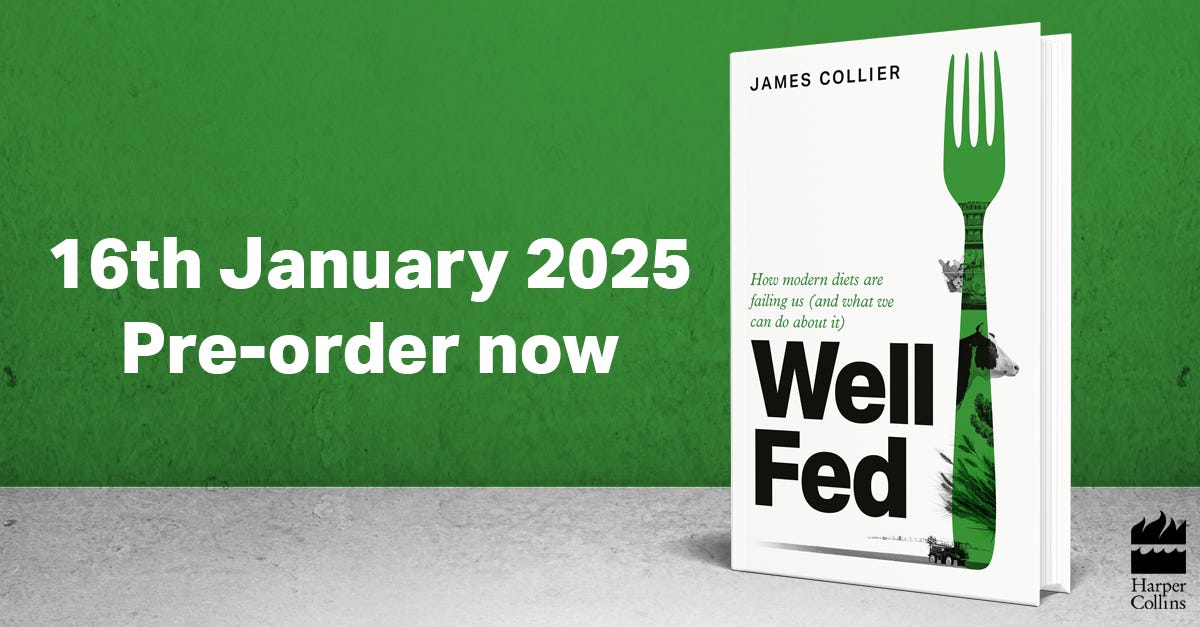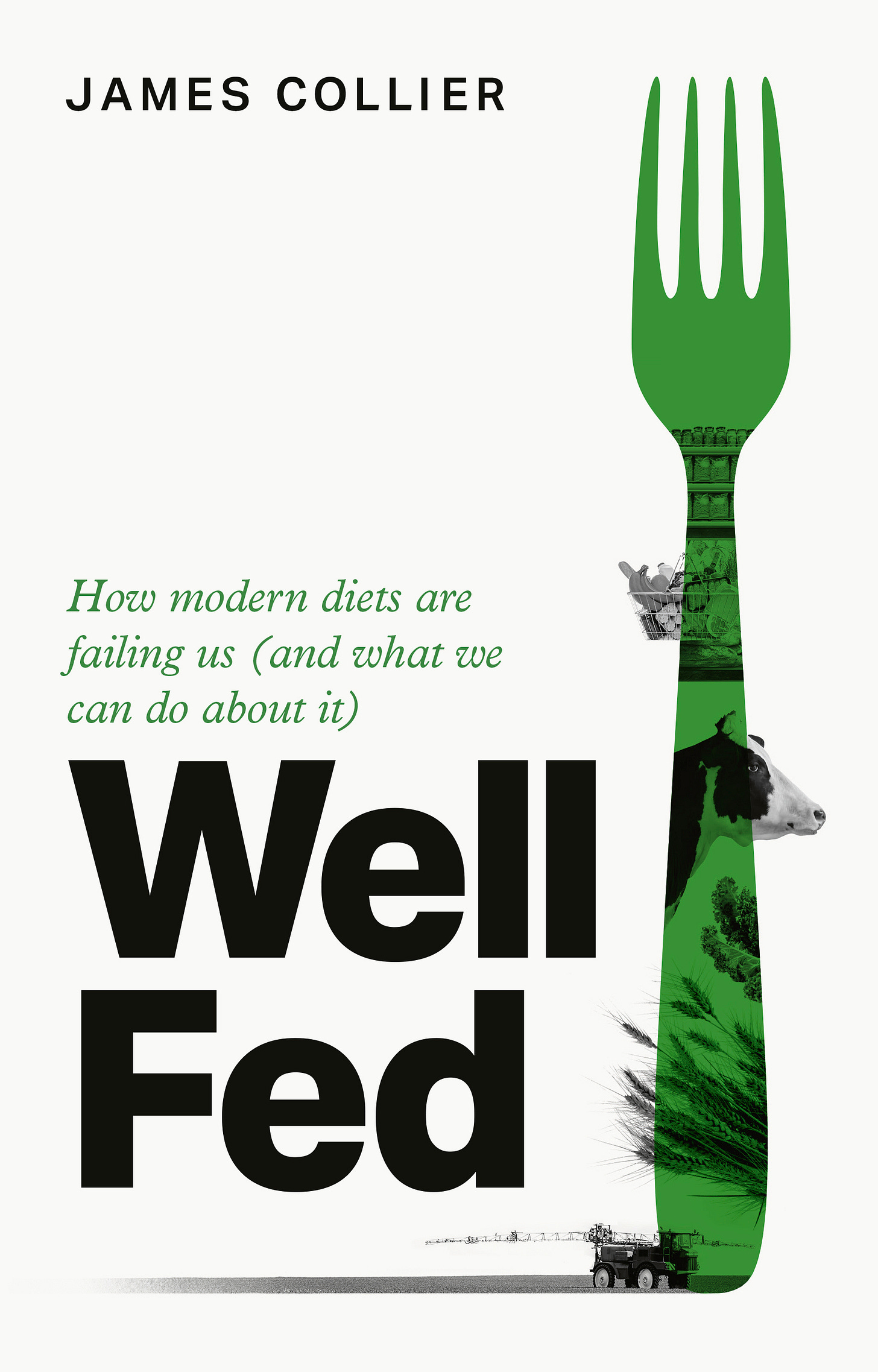My First Book: Available for Pre-Order Now!
Well Fed: How modern diets are failing us (and what we can do about it)
Many make the claim that “the global food system is broken”.
I don’t agree.
In many ways, it’s been getting better.
Today, more and more people enjoy greater access to sufficient calories and protein.
Between 2005 and 2019, the number of people facing hunger decreased by 150 million.
Yet, in other respects, it’s travelling in the wrong direction: our environment is being destroyed, animals are increasingly exploited and metabolic diseases of excess prevail.
We are living longer but spending more years in sickness.
Faced with overwhelming choice, we waste shocking amounts of food every year, despite persistent undernutrition being experienced in many regions.
The industrialisation of eating has driven us to produce food that endangers biodiversity, is less nutritious than intended, causes unnecessary suffering and irreversibly harms the environment.
As explained in Well Fed: How modern diets are failing us and what we can do about it), what’s at stake is not just our own health, but that of our planet and the people and animals that populate it.
The book highlights the critically important concerns that relate to poor nutrition and its impact on physical and mental health, the environment and animal welfare.
Wonderfully enlightening and engagingly written. ‘Well Fed’ navigates the complex world of food systems with clarity and thoughtful insight. James skillfully demystifies nutritional science and sustainability, guiding readers through the imperfections of our food system and the importance of informed food choices.
- Dr Idz, Social Media Influencer (+3m), Medical Doctor and Author of ‘Saturated Facts’
In Well Fed, I explore why we’re confronted by these challenges by first looking at why we choose the foods we do, and how history and nutrition science have endowed us with the necessary tools and technologies to overcome these concerns. Well Fed offers clear and practical advice to help you make better food choices by prioritising your health and wellbeing, while simultaneously addressing environmental and ethical concerns. A diet isn’t sustainable if it can’t sustain an individual.
Drawing on insights from history, philosophy and science, Well Fed illustrates how behavioural choice underlies key problems in relation to our food system and goes on to explore possible solutions. Although we have a limited ability to affect the behaviour of others, we can look at ourselves and think more carefully about what we choose to put in our mouths. I propose a strategy that starts with you, as, ultimately, it’s you who has the final say in what you choose to eat. Your food choice will influence, first and foremost, your own health and wellbeing, but it also impacts other living beings – both humans and nonhumans – and the environment.
Well Fed is a fresh take on how our everyday food choices shape our health and the planet, that's both thought-provoking and practical.
- Dr Emily Leeming, Scientist, Dietitian and Bestselling Author of ‘Genius Gut’
Well Fed provides a dietary philosophy that offers a solution to the problems of the modern food system, pointing to the key considerations, and conveniently lays them out in the five key pillars of “contemplative nutrition”:
Food and our physical health and performance
Nutrition for our mental wellbeing
Sustainable eating
Ethical consideration
Eating in the company of others
Just as psychologists are encouraging us to be more self-aware, we can be more mindful of the foods we eat. The contemplative nutrition philosophy provides a desperately needed solution that will – at least in part – address the impact of our food system on issues relating to the physical and mental health of individuals, the climate emergency and the questionable farming systems that contribute to the unnecessary suffering of animals, while allowing sufficient production of affordable, convenient and enjoyable food that will satisfy human desires. Contemplative nutrition requires you to pause and think – just a little – about what you eat.
To simultaneously acknowledge crucial modern health, ecological and ethical concerns, individuals must make considered and reason-based decisions. If we don’t change the way we view food, we’ll witness worsening levels of metabolic disease, mental wellbeing and ecological disasters that will ultimately affect all of humankind, animals and the environment.
In his insightful book, James has skilfully shown us the links between human health, human ethics and planetary health like never before. He highlights the importance of combining traditions (home cooked meals and eating with others) with modern nutrition science and food technology to provide a hopeful vision for a healthy future for humans and planet.
- Dr Gemma Newman, Physician, Speaker and Author of 'The Plant Power Doctor' and 'Get Well, Stay Well'
Within all this, however, we are faced with constant conflicting nutrition information, and it is becoming increasingly difficult to find reliable insights, with the role of the media compounding this experience.
Fortunately, a suitable dietary strategy can be realistic, sensible, straightforward and enjoyable. Crucially, contemplative nutrition does not need a prescriptive regimen: it merely encourages reflection when selecting what to eat. Although a contemplative diet for one individual might be different to that of someone else, the common feature involves making food choices that are advantageous to the individual’s physical and mental wellbeing while causing minimal unnecessary suffering to animals and minimal adverse environmental impact.
Changing our diets for the better needn’t be as hard as it sounds. Hundreds of thousands of years of evolution have taught us how to successfully fine-tune our nutritional intake by leveraging all available food sources that have accompanied our existence. Humans are omnivorous animals who, through adaptations, are able to acquire nutrition from a wide range of plant, animal, fungi and microbial matter. Humans are the only primates who share their acquisitions, and doing so has provided significant evolutionary advantages. While some members of our social group were out hunting for dinner, others were busy gathering berries and tubers. This division of labour helped to ensure a stable, dependable source of food for everyone in the tribe when the hunters had an unsuccessful day. This predisposition for sharing has contributed to the development of altruistic behaviour.
If you are looking at ways to combat the exploitation of the planet this book is for you. Outlining the environmental, nutritional and ethical considerations it is possible to contribute towards the change we desperately need to see. James breaks down the science into attainable actions, simple changes to our diets that are necessary and achievable. Thank you for bringing the ethics of the food we are so deeply disconnected from to the forefront of our minds.
- Rhiannon Lambert, Nutritionist, Podcaster and Bestselling Author of ‘The Science of Nutrition’ and ‘The Science of Plant-Based Nutrition’
Despite the popularity of nutrition books, no publication simultaneously explores the impact of dietary choice on physical health, longevity and performance, cognition and mental health, the environment, animal welfare, human rights and those with whom you enjoy your meals. Well Fed provides solutions. These solutions combine traditional eating and food preparation with modern nutrition science, food technology, systems of agriculture and food production methods.
Moving from the theoretical and technical to a provocative vision for change, one meal at a time, Well Fed brings together work from private and public sector professionals, academics and think tank experts to highlight ground-breaking insights for readers interested in making more thoughtful food choices that will not only benefit our own wellbeing, but that of our planet as well. Well Fed unites nutrition science and food philosophy through a highly engaging and easy-to-read narrative.
Pre-order Well Fed now!
Here’s what others have to say about Well Fed:
Well Fed brings a fresh perspective to the complex relationship between nutrition, our health, and the planet. His approach empowers readers to make informed choices, balancing personal well-being with environmental sustainability. As a fellow advocate for reducing (less nutritious) ultra-processed foods, I fully support his vision of a food system where eating well also means caring for our planet.
- Nichola Ludlam-Raine, Specialist Dietitian and Author of How Not to Eat Ultra-Processed
An insightful and upbeat book on the history, ethics and sustainability of food. James shows us how we ended up with the challenges of our modern food landscape, and gives us the tools to navigate it.
- Barbara Bray MBE, Healthy Ageing Nutrition Expert, PhD Researcher
James combines decades of experience as a nutritionist, a wide range of expert sources with a deep understanding of how we assimilate and digest information today to bring all important mindfulness back into what we eat.
- Mallika Basu, Food Writer and Presenter
James Collier’s Well Fed is a groundbreaking exploration of our food choices and their far-reaching impacts on health, ethics, and the environment. With clarity and compassion, he guides us through the complexities of the modern food system, encouraging thoughtful reflection and empowering readers to make informed decisions. This book is a must-read for anyone looking to enhance their well-being while contributing to a more sustainable planet.
- Kristen Holmes, Global Head of Human Performance, WHOOP
Well Fed is a vital tool in the ongoing battle against nutrition misinformation. James expertly breaks down complex topics, such as the flawed obsession with body mass index, the manipulative influence of food marketing, and the misleading promises of social media influencers. With his pragmatic approach to concepts like ‘contemplative nutrition,’ this book doesn’t just dispel myths – it offers a balanced, thoughtful path forward. In a world overwhelmed by conflicting advice, Well Fed succeeds in guiding readers through the noise, reminding us that real progress requires both knowledge and accountability. Books like this are essential for empowering consumers to make informed decisions, building healthier habits, and resisting the fearmongering that plagues modern food discourse.
- Robbie Lockie, CEO & Founder of The Freedom Food Alliance & Co-founder of Plant Based News


